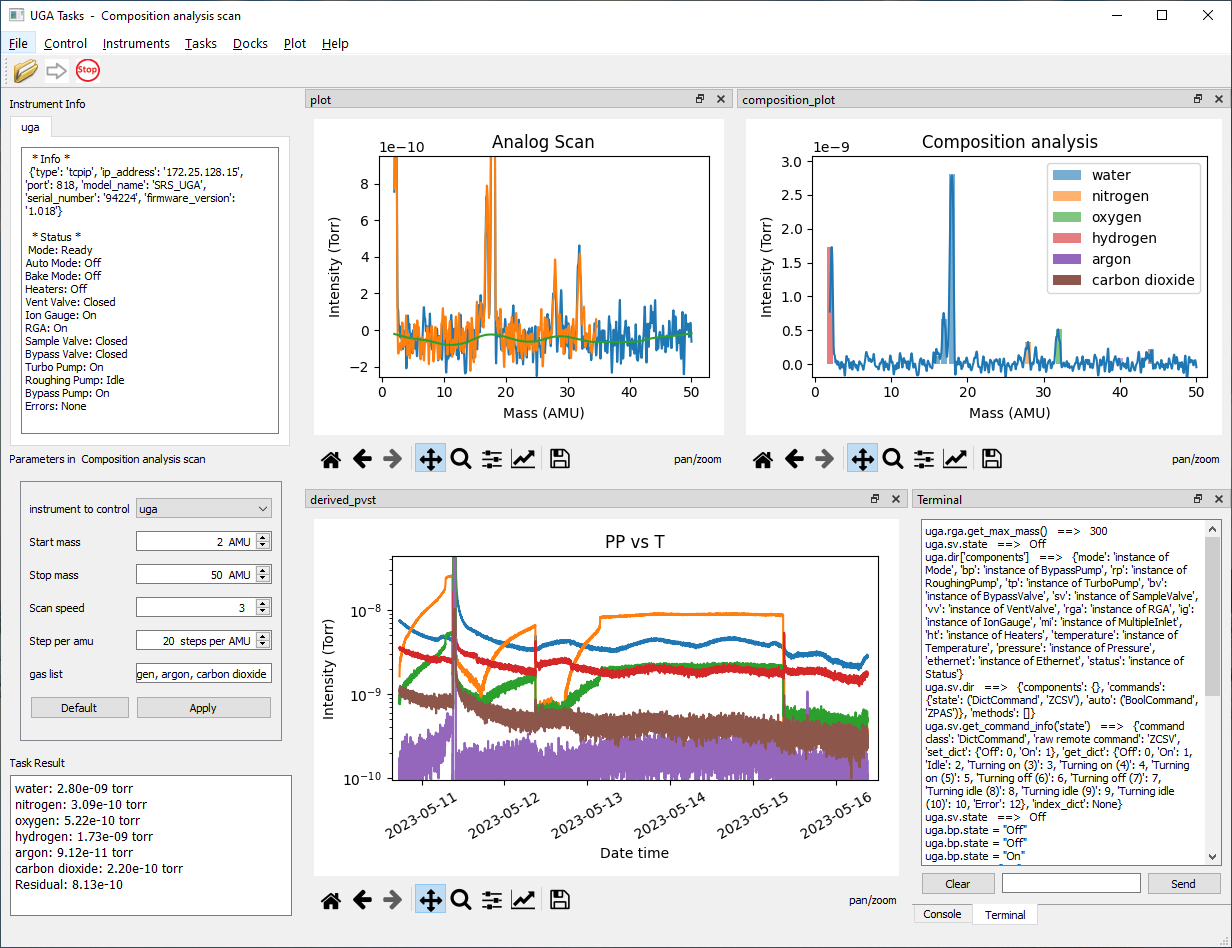Instrument driver package for Universal Gas Analyzers (UGA) from Stanford Research Systems
Project description
srsinst.uga
srsinst.uga contains a Python instrument driver to control and acquire
mass spectra of atmospheric gas samples from
Stanford Research Systems (SRS) Universal Gas Analyzer (UGA).
It also provides a collection of Python scripts that runs on a graphic user interface (GUI) based on
srsgui and
srsinst.rga.
Installation
You need a working Python version 3.7 or later with pip (Python package installer) installed.
If you don't, install Python 3 to your system.
To install srsinst.uga as an instrument driver only, use Python package installer pip
from the command line.
python -m pip install srsinst.uga
To use its full GUI application, create a virtual environment, if necessary, and install with [full] option:
# To create a simple virtual environment (Optional)
python -m venv venv
venv\scripts\activate
# To install full GUI application
python -m pip install srsinst.uga[full]
Run srsinst.uga as GUI application
If the Python Scripts directory is in PATH environment variable, Start the application by typing from the command line:
uga
If not,
python -m srsinst.uga
It will start the GUI application.
Connect to an UGA from the Instruments menu. Select a task from the Task menu. The available tasks are to acquire data from UGA and to run various RGA scans. Press the green arrow to run the selected task.
There is a tree view widget displaying commands to adjust interactively. It can be accessed from the main menu/Docks/uga-Capture. Double-clicking on a value can change the command parameter, if allowed.
You can write your own task or modify an existing one and run it from the application by adding it to a ".taskconfig" configuration file.
Use srsinst.uga as instrument driver
Connect to UGA
- Start a Python program, a Jupyter notebook, or an editor of your choice to write a Python script.
- import the UGA100 class from
srsinst.ugapackage. - Instantiate UGA100 to connect to an SRS UGA.
|
C:\>python
Python 3.8.3 (tags/v3.8.3:6f8c832, May 13 2020, 22:37:02) [MSC v.1924 64 bit (AMD64)] on win32
Type "help", "copyright", "credits" or "license" for more information.
>>>
>>> from srsinst.uga import UGA100
>>>
>>> ip_address = '172.25.128.13' # Use IP address of your UGA
>>> user_id = 'srsuga'
>>> password = 'srsuga'
>>>
>>> uga = UGA100('tcpip',ip_address, user_id, password)
>>>
>>> # for serial communication
>>> # Baud rate for UGA100 is available: 28800 and 38400
>>> # uga2 = UGA100('serial', /dev/ttyUSB0', 28800) # for Linux serial communication
>>> # or,
>>> # uga2 = UGA100('serial', 'COM3', 28800) # for Windows serial communication
>>> # or,
>>> # initialize a RGA100 instance without connection, then connect.
>>> # uga3 = UGA100()
>>> # uga3.connect('tcpip', ip_address, user_id, password)
-
Query check_id() to configure components of the connected UGA properly,
depending on the variation: UGA, UGA_LT, UGA_HT, or UGA_PM.uga.check_id() > ('SRS_UGA', '94224', '1.018')
UGA100 comprises multiple subcomponents, their associated commands and class methods.
Component class has a convenience attribute dir to show its available attributes
and methods in the Python dictionary format.
>>> uga.dir.keys()
dict_keys(['components', 'commands', 'methods'])
UGA100 has more than 10 components holding their remote commands and methods to configure and acquire data from a UGA unit.
>>> uga.dir['components']
{'mode': 'instance of Mode',
'bp': 'instance of BypassPump',
'rp': 'instance of RoughingPump',
'tp': 'instance of TurboPump',
'vv': 'instance of VentValve',
'rga': 'instance of RGA',
'ig': 'instance of IonGauge',
'ht': 'instance of Heaters',
'temperature': 'instance of Temperature',
'pressure': 'instance of Pressure',
'ethernet': 'instance of Ethernet',
'status': 'instance of Status'}
Control UGA100 components
Let's control the ion gauge. It has no subcomponents, two commands, and a method.
>>> uga.ig.dir
{'components': {},
'commands': {'state': ('DictCommand', 'ZCIG'),
'filament': ('DictCommand', 'ZPFL')},
'methods': ['get_pressure']}
The state commands is to turn on and off the ion gauge, and the filament command is to select a filament to use.
>>> uga.ig.filament
'Fil. 1'
>>> uga1.ig.state
'Off'
>>> uga1.ig.state = 'On'
>>> uga1.ig.state
'On'
With get_command_info() method, you can find out what parameter to use to set the command and what parameters to expect for a query reply. For the uga.ig.state command, you can use 'Off', 'On', or 'Degas' parameters to set the state, and you will get one of 12 possible states.
>>> uga.ig.get_command_info('state')
{'command class': 'DictCommand',
'raw remote command': 'ZCIG',
'set_dict': {'Off': 0,
'On': 1,
'Degas': 2},
'get_dict': {'Off': 0,
'On': 1,
'Idle': 2,
'Turning on (3)': 3,
'Turning on (4)': 4,
'Turning on (5)': 5,
'Turning off (6)': 6,
'Turning off (7)': 7,
'Turning idle (8)': 8,
'Turning idle (9)': 9,
'Turning idle (10)': 10,
'Error': 12},
'index_dict': None}
When the ion gauge is on, you can get a pressure measurement with the get_pressure() method.
>>> uga.ig.get_pressure()
1.115742e-07
Commands in other components can be used in a similar way.
The most important component in a UGA is the Residual Gas Analyzer, which has the separate RGA instrument driver package for its independent usage. Refer to RGA documentation for RGA component usage.
>>> uga.rga.status.id_string
'SRSRGA200VER0.24SN12226'
>>> uga.rga.ionizer.emission_current
0.9976
Project details
Download files
Download the file for your platform. If you're not sure which to choose, learn more about installing packages.
Source Distribution
Built Distribution
Hashes for srsinst.uga-0.1.0-py3-none-any.whl
| Algorithm | Hash digest | |
|---|---|---|
| SHA256 | 2cf7068f03da72ab96ecdc1d8266d84501f0c75d8f8da4812b2f356e82ca0901 |
|
| MD5 | ec476f895189d68f740b88ea280e2761 |
|
| BLAKE2b-256 | 5c18f39cfe3040a5af5929ba52e68bcb68ce77fb46db52496aae14109d1f24c6 |












